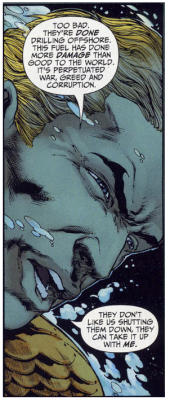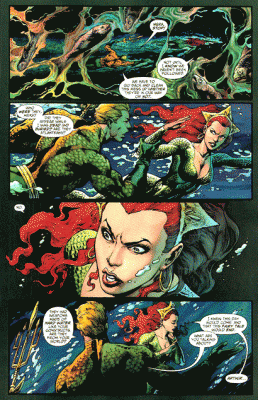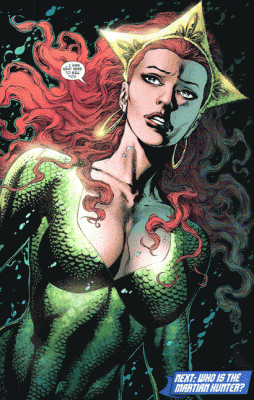

It’s not “Liberalism” that’s hurting comic book sales — it’s lack of imagination
Over at Bleeding Cool, someone called Darin Wagner thinks he has hit upon the primary reason that comic book sales have been steadily declining. And as it turns out, he has actually hit upon the primary reason that comic book sales have been steadily declining, and he stumbles into it in the second paragraph of his essay:
You pick up a superhero comic book featuring a childhood favorite of yours, hoping to reignite some of that magic you felt way back when and you see that the opening sequence in the comic deals with an oil rig disaster. You immediately and disappointingly know what’s going to be said, either by your childhood favorite or by some other character given credibility within the story. You turn the page, and sure enough, your childhood favorite grumbles about his/her country’s dependency on oil or how inherently dangerous oil drilling is to the environment and how it’s not worth it or simply mutters to him-or-herself briefly about the evils of corporate America. That’s when you put the comic back on the shelf and your local retailer loses a sale. (Sound familiar? Brightest Day #5 contained a similar scenario featuring Aquaman.)
Mr. Wagner claims that it’s “liberalism” that is — or, per the title of his piece, “may be” — hurting comic book sales. He claims that it’s Aquaman’s grumbling about oil drilling and the dangers of said practice that represents the “liberalism” that’s turning off readers. But it isn’t that.
Re-read Mr. Wagner’s description of the opening scene of that particular comic book. This story takes place in a world in which there is a S.T.A.R. Labs. There exist dozens of geniuses in any number of fields. There are dozens of alien devices and elements and magical items to which they have access. Why, in a universe such as this, are they still using oil?
You’re telling me that Ray Allen Palmer(!)*, who used “white dwarf star matter” to create a means of shrinking himself to microscopic size couldn’t come up with a better, cleaner, more efficient way to power the cars that they drive in the DCU? Doctor Fate can’t just magically create a fleet of cars that run on magic stardust, and then create an unlimited supply of magic stardust?
Comic book creators have been resistant to introducing real-world implications into their stories for as long as comics have existed. They could not care less about what would happen to the average person-on-the-street in a world filled with supergeniuses and magical figures. They have ignored the rich storytelling opportunities opened up by exploring what a world of superheroes would really be like. (What would housing look like in a world where you can create structures that are bigger on the inside than outside? What would security be like in a world where people can level entire cities with a thought? Would we all have jet packs? Would we have had them 50 years ago?) What they care about is re-telling the same stories over and over and over and over again, over and over.
But let’s say, for the sake of argument, in this DCU in which there are supergeniuses and magicians, they are still drilling for oil in exactly the same manner we do here in the real world (which features a distinct lack of supergeniuses and magicians). The DCU features Atlantis, a continent that fell into the sea following a skull-shaped meteor strike on the earth. Rather than just pick up and move to a continent that hadn’t sunk into the sea, the Atlantis scientists instead figured out a way to turn themselves into aquatic mammals that could breathe ocean water, and withstand the intense pressure of the ocean. In this world, the surface dwellers would have to deal with the Atlantisians (“Atlanteans”?) in order to get permission to drill in the oceans in which they live. That opens up an entire new set of potential stories. How do the two groups of people get along? What do the Atlantisians get in return for using their seas in this manner? Could the Atlantisians mine the surface for some power source? Would “radical Atlantisians” throw water bombs at surfacers?
And what would the oil rigs themselves look like? How would Ray Allen Palmer(!)* design one? Would it be made of Nth metal, and therefore indestructible, making oil rig disasters all but impossible?
The creators of mainstream corporate comics today do not care about any of this. I’ve said it before, and it’s so depressing it bears repeating: Comic books as they exist today are nothing more than advertising pamphlets for movie and television properties. That’s all. The people creating them don’t care about what’s actually going on in them (or if they do, they do a fantastic job of hiding it). They don’t care about exploring the implications of the worlds they create. They care about licensing and merchandising.
How little imagination to they exhibit? Here’s a page from that same issue referenced by Mr. Wagner in his essay:
Aquaman was dead — and then came back to life! That’s so… typical. But then, on the very next page we get this *cliffhanger* ending:
(Both Brightest Day scans were swiped from the lovely Aquaman Shrine.)
Aquaman has already established — on the previous page! — that he’s been dead and come back to life, and somehow the fact that someone has been sent to “kill” him is supposed to create breathless tension that will compel us to pick up the next issue.
But it was his wife that was “sent” to “kill” him! Who sent her? Will she actually do it? And if she does do it, how long before he comes back to life yet again? I gotta pick up the next issue!
DC’s treatment of Aquaman is so fantastically pathetic, and an object lesson in everything that is wrong with modern comics, that I wrote a long essay about it here. They’ve made him into a PoMo joke, a commentary on the reaction to the character by people who don’t read comics at all, rather than owning him as character with the potential to be the most important and powerful player in the DCU. Over 80% of the world is ocean, and Aquaman rules the ocean, for crying out loud. But what are the creators doing with him?
Heroes will be tweaked and aged down to showcase them not as established titans but as strivers who “have to sweat to fight the bad guys,” [Jim] Lee says. For example, Johns’ new take on Aquaman — here THR offers an exclusive sneak peek at pages 5 to 8 of issue No. 1, with art by Ivan Reis and Joe Prado — retools the underwater-breathing hero so he is no longer the king of Atlantis and now plays off his second-banana status.
“Geoff has dived into the grandeur of the character while addressing that he’s been a running joke,” Lee says. “It’s going to have humor and majesty.”
If Aquaman were a real, actual, living being, he would be regarded as one of the most amazing people on the planet. I bet you that he would be one of the most — if not the most — popular superheroes, if for no other reason than our ever-present worries about climate change. Aquaman would be a fetish figure.
DC — or, rather, the “creators” at DC — don’t care about any of that. They’re trying to “optimize brand appeal.”
In his introduction to his story collection Strange Wine, Harlan Ellison (a sometime comics writer himself) wrote, regarding the dinosaurs,
“They lived 130,000,000 years and vanished. Why? Because they had no imagination. Unlike human beings who have it and use it and build their future rather than merely passing through their lives as if they were spectators. Spectators watching television, one might say.”
That is just about the best explanation of what is happening to the mainstream comic book industry today. A bunch of dinosaurs with no imagination, not trying to build a future at all, but continually re-writing the past, and keeping their eyes on television, movies, and video games, where they hope to license the properties they caretake.
And that is what’s hurting comic book sales.
*Corrected Jan 13 2012 @8:45PM PST — Many thanks to the gracious “Bruce” for pointing out my error in the comments.
Latest posts by Ricky Sprague (Posts)
- Meet the start-ups that are thriving in the current economic recovery - May 27, 2016
- How a Wonder Woman comic from 1942 led to the Great California Cow Exodus of 2012, maybe - November 28, 2012
- A common-sense approach to restoring economic prosperity - November 19, 2012
- New Philip K. Dick novel too absurd to be believed - September 17, 2012
- My 90 Days, 90 Reasons submission - September 12, 2012
 Print This Post
Print This Post







It’s Ray *Palmer*, dumbass.
Barry Allen is the Flash.
Thanks for the gentlemanly correction, Bruce. I’m so embarrassed.
I guess it depends when your childhood was. When I was first reading comics in the early 1970s, it was stuff by Steve Gerber, Steve Englehart, and Denny O’Neil. Check out some of their books from that time. About as “liberal” as you can get. I’d also look at Steve Skeates on Aquaman.